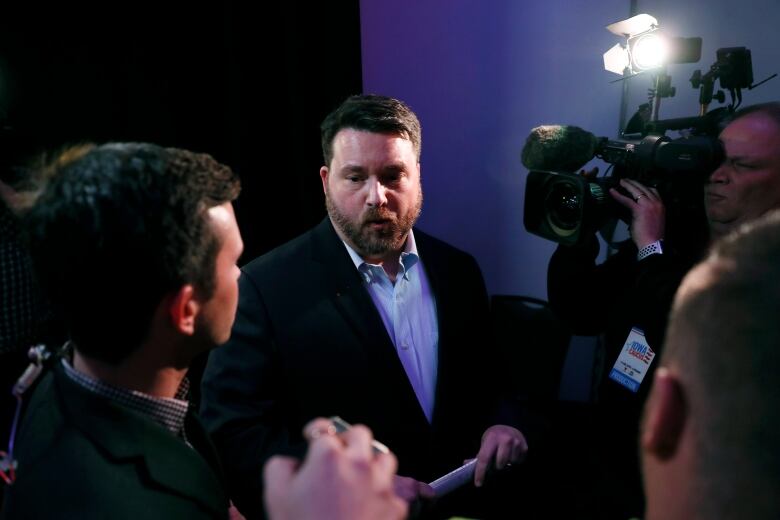Buttigieg narrowly defeats Sanders in final Iowa tally
Democratic National Committee chair calls for 'recanvass' of caucus results

Pete Buttigieg narrowly won Iowa's Democratic presidential caucuses on Thursday after a long delay in releasing the results, reshaping the 2020 race and raising doubts about the future of one-time front-runner Joe Biden, who finished a disappointing fourth.
In the first contest in the race to pick a challenger to Republican President Donald Trump for the November election, the moderate 38-year-old former mayor of South Bend, Ind., edged out progressive Sen. Bernie Sanders 26.2 per cent to 26.1 per cent, the Iowa Democratic Party (IDP) said.
Earlier in the day, the chair of the Democratic National Committee called for a "recanvass" of the results, saying it was needed to "assure public confidence" after three days of technical issues and delays.
"Enough is enough," party leader Tom Perez wrote on Twitter.
With 100 per cent of precincts reporting, the IDP said Sen. Elizabeth Warren finished third with 18 per cent of state-delegate equivalents, the data traditionally used to determine the winner, while Biden limped to a disappointing fourth with 15.8 per cent. Sen. Amy Klobuchar finished fifth with 12.3 per cent.

The Associated Press said it was unable to declare a winner in the caucuses because "there is evidence the party has not accurately tabulated some of its results, including those released late Thursday that the party reported as complete."
The state party apologized for technical glitches with an app that slowed down reporting of results from Monday's caucuses and has spent the week trying to verify results. However, it was unclear if the party planned to follow the directive of the national leader to recanvass those results, a process that would likely require state officials to review caucus math worksheets completed at more than 1,600 caucus sites to ensure the calculations were done correctly and matched the reported results.
Iowa chairman Troy Price suggested in a statement Thursday that he would pursue a recanvass only if one was requested by a campaign.
The deadlocked contest gives both Buttigieg and Sanders a burst of momentum as they seek to pull away from the crowded field.
The caucus crisis was an embarrassing twist after months of promoting Iowa as a chance for Democrats to find some clarity in a jumbled 2020 field. Instead, after a buildup that featured seven rounds of debates, nearly $1 billion spent nationwide and a year of political jockeying, caucus day ended with no winner and no official results.
Campaigning in New Hampshire, Sanders called the IDP's management of the caucuses a "screw-up" that has been "extremely unfair" to the candidates and their supporters.
"I really do feel bad for the people of Iowa," said Sanders, who added that it was "an outrage that they were that unprepared."

Iowa marked the first contest in a primary season that will span all 50 states and several U.S. territories, ending at the party's national convention in July.
As first reported by The New York Times, numerous precincts reported results that contained errors or were inconsistent with party rules. For example, the AP confirmed that dozens of precincts reported more final alignment votes than first alignment votes, which is not possible under party rules. In other precincts, viable candidates lost votes from the first alignment tally to the final, which is also inconsistent with party rules.
Some precincts made apparent errors in awarding state delegate equivalents to candidates. A handful of precincts awarded more state delegate equivalents than they had available. A few others didn't award all of theirs.
Trump relished in the Democratic turmoil.

"The Democrats, they can't count some simple votes and yet they want to take over your health-care system," Trump said at a White House event Thursday celebrating his impeachment trial acquittal. "Think of that — no, think of that."
New Hampshire holds the first primary election in the Democrats' 2020 nomination fight on Tuesday. Both Buttigieg and Sanders are leading contenders there, as well.
The two men are separated by 40 years in age and conflicting ideology.
Sanders, a 78-year-old self-described democratic socialist, has been a progressive powerhouse for decades. Buttigieg, a 38-year-old former municipal official, represents the more moderate wing of the Democratic Party. Buttigieg is also the first openly gay candidate to earn presidential primary delegates.
Their strength in Iowa put them in the crosshairs of rivals as the race shifted to New Hampshire. Biden, who fell far short of expectations in Iowa, cast both Buttigieg and Sanders as risky choices for Democrats, given the former mayor's relative inexperience and the senator's descriptions of himself as a socialist.
Sanders is making his second run for the White House. He surprised many Democrats in 2016 with his strong challenge to Hillary Clinton, but entered the 2020 contest as a front-runner. He's topped the field in fundraising, despite eschewing high-dollar donors.
With files from Reuters